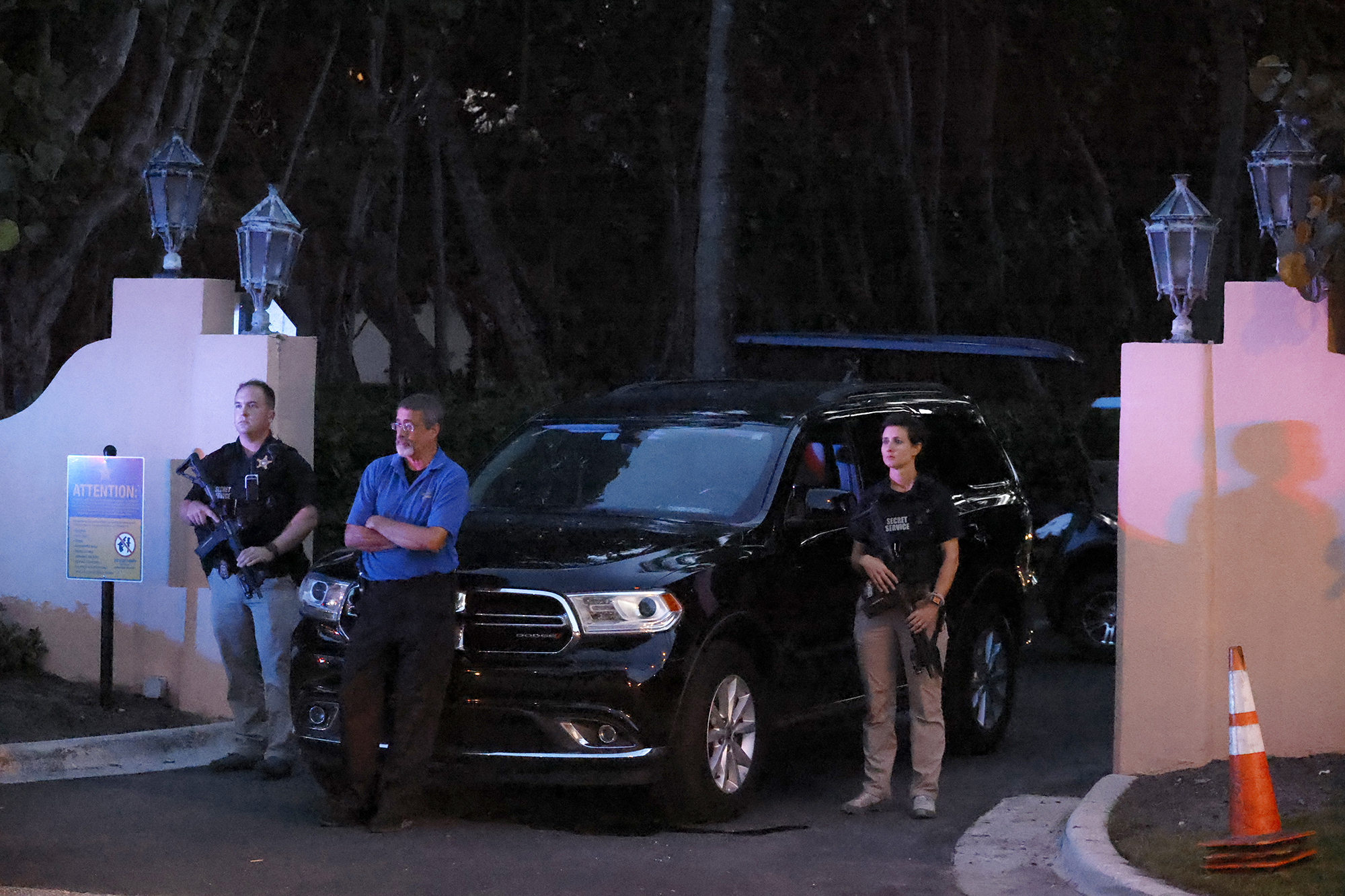
Armed Secret Service agents stand outside an entrance to former President Donald Trump's Mar-a-Lago estate, late Monday, Aug. 8, 2022, in Palm Beach, Florida
Why would the FBI conduct an unprecedented court-authorized search at the home of a former president of the United States?
That is the wrong question for journalists to ask. These are better ones:
Why was such a search unprecedented?
Have no previous presidents or ex-presidents ever done anything significant enough to have warranted such a search?
Was this particular search warranted based on the best available information we have?
We have to change the framing of the discussion concerning the very serious decision by the Federal Bureau of Investigation to execute a search warrant against former President Donald Trump at his Mar-a-Lago home in Florida. That can’t happen with a conventional lens — an adherence to the idea that a U.S. president should receive less scrutiny by law enforcement because he is or has been president.
Unfortunately, there is a long history of law enforcement treating the president of the United States with kid gloves while he’s in office, and even afterwards because of the privileges afforded to him after he departs 1600 Pennsylvania Avenue. We know that internal Department of Justice guidance from the Nixon era that sitting presidents shouldn’t be indicted was adhered to throughout Trump’s time in the Oval Office. Law enforcement has long decided, for whatever reason, that the more power a person has, the less likely they’ll receive real scrutiny.
That thinking was evident during the Obama years when the Department of Justice effectively made real the term “too big to jail” when it came to the banking institutions that helped lead us into what was the worst economic recession since the Great Depression. It’s evident in analyses showing that the IRS audits the poorest Americans more frequently than the richest. It became even clearer during the Trump years.
Don’t ask why the FBI would take this unprecedented step. Ask what damage has long been done to this country from the fact that this is the first time it ever has.
The United States of America prides itself on its status as the world’s oldest, most powerful, most stable democracy. We love to recount tales of George Washington declining to continue serving as president beyond a second term, setting a precedent for term limits in the executive branch. And yet, over the past several decades, we’ve convinced ourselves our democracy isn’t strong enough to hold a president accountable while he’s in office — or even when he’s out of office and not on the ballot.
How did that come to be?
I was a baby at the end of the Nixon era so I wasn’t aware enough to understand what was happening then. But I was a young reporter when the Clinton affair was unfolding. The then-president had entered into a secret extramarital affair with a young White House intern and lied about it under oath during a deposition in a civil case in which Paula Jones had accused him of sexual harassment. Despite all the noise, no one made a convincing case as to why, if warranted, Clinton should not have faced serious consequences for his actions.
Had he been thrown out of office after impeachment, what would have happened? Al Gore, his vice president, would have become president. That’s all. The world would have continued turning. Political opportunists of all stripes would have tried to use that outcome to their benefit — which is what they do with everything.
Special counsel Robert Mueller spent nearly two years investigating Russia’s interference in the 2016 presidential election. Had his team indicted Trump — they indicted or received guilty pleas from nearly three dozen people, including six former Trump advisers — or convicted him for the alleged crimes documented in the Mueller report, it would not have mortally wounded our democracy. It would have simply removed someone from power who had proven himself unfit to serve.
We’ve seen this on the state level multiple times. I’m from South Carolina. I was a columnist tracking the Mark Sanford governorship when Sanford ditched his security detail and secretly left the country to visit a woman with whom he had an extramarital affair. We didn’t realize he was gone until a reporter was tipped off to be at the airport when he was returning; his actual absence was so inconsequential. Our state did not cease to function because our executive literally went AWOL. Just as Illinois didn’t implode when its governor was charged with corruption. Or Oklahoma when its governor was indicted on racketeering and extortion charges.
It will be difficult to ignore the political noise, talk of political persecution, and conspiracy theories about the “deep state.” Trump will use such conspiracy theories to his political benefit. But it is unwise for journalists to act as though that should be our top concern or call such a move “genius,” as CNN’s Dana Bash unwisely did. It’s not genius. It’s cynical and typical of Trump, a man who has proven over and over again that he is most concerned with his own fate, even if it means the demise of this two-and-a-half-century-long democratic experiment.
I don’t know what the FBI’s court-authorized search of Mar-a-Lago will mean for Trump’s political fortunes or how this will affect the midterm elections. None of us does. It’s all speculation at this point. That’s another reason journalists should maintain our focus on what we know and ensuring those in power are transparent. We should be demanding that the FBI prove its case, show why this action was warranted, and demonstrate that this is not an abuse of power. There is no early indication that the FBI overstepped or made spurious decisions, but there are too many incidents of the FBI doing awful things to everyday citizens. For example, I’m currently looking into a case in which the FBI targeted the wrong men in a horrific kidnapping, rape, and murder case that garnered national attention over several years, a period during which that family was nearly destroyed by the allegations and the public’s reaction to them.
We should help audiences understand how this search fits with the Justice Department’s long-held principle of not interfering in elections and why this is nothing like what the FBI did in 2016. Then-FBI Director James Comey injected himself into a close election at the 11th hour against Hillary Clinton, even as the FBI office in New York told The New York Times its probe into Trump wasn’t going anywhere. That was overstepping, putting a thumb on the political scale. That was an act that could have been the difference between a Trump presidency and a Clinton administration. What the FBI did Monday is not that. We are months out from the midterms. Trump is not a candidate anyway.
If we can’t hold a president to account while he’s in office or when he’s no longer in office and not even on the ballot, when can we? And if we don’t hold presidents to account, is it really true that no American is above the law?
The DOJ did break with tradition. Sure. But why did a free nation built upon the rule of law allow such a tradition to take hold and remain for so long in the first place?
Issac Bailey, a 2014 Nieman Fellow, is a journalist, race relations seminar creator and facilitator, and the author of “Why Didn’t We Riot? A Black Man in Trumpland” (Other Press, October 2020) and “My Brother Moochie: Regaining Dignity in the Face of Crime, Poverty, and Racism in the American South” (Other Press, 2018).


